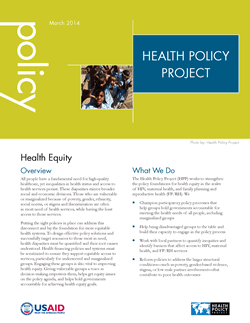The Health Policy Project ended in 2016. Work continued under Health Policy Plus (HP+) until 2022.
Health Equity

Madison Mellish/Health Policy Project
Overview
All people have a fundamental need for high-quality healthcare, yet inequalities in health status and access to health services persist. These disparities mirror broader social and economic divisions. Those who are vulnerable or marginalized because of poverty, gender, ethnicity, social norms, or stigma and discrimination are often in most need of health services, while having the least access to those services.
Putting the right policies in place can address this disconnect and lay the foundation for more equitable health systems. To design effective policy solutions and successfully target resources to those most in need, health disparities must be quantified and their root causes understood. Health financing policies and systems must be scrutinized to ensure they support equitable access to services, particularly for underserved and marginalized groups. Engaging these groups is also vital to improving health equity. Giving vulnerable groups a voice in decision making empowers them, helps get equity issues on the policy agenda, and helps hold governments accountable for achieving health equity goals.
What We Do
The Health Policy Project (HPP) works to strengthen the policy foundations for health equity in the realm of HIV, maternal health, and family planning and reproductive health (FP/RH). We
- Champion participatory policy processes that help groups hold governments accountable for meeting the health needs of all people, including marginalized groups
- Help bring disadvantaged groups to the table and build their capacity to engage in the policy process
- Work with local partners to quantify inequities and identify barriers that affect access to HIV, maternal health, and FP/RH services
- Reform policies to address the larger structural conditions—such as poverty, gender-based violence, stigma, or low male partner involvement—that contribute to poor health outcomes
- Improve the use of strategic information and push for evidence-based policies to address health inequities
- Employ economic analysis and revise health financing policies to promote efficient and equitable use of resources
- Strive to reduce barriers posed by stigma and discrimination
- Foster policy responses to empower women and girls, promote gender equality, and strengthen implementation of gender policy
Building Capacity
Our work in capacity development helps ensure that those most in need—women and girls, the poor, and other marginalized and vulnerable populations—have a voice in the policy process to improve their access to health services. We build the capacity of underserved groups to engage in advocacy and policy dialogue and hold governments accountable. We also develop host-country capacity to identify barriers to access and design evidence-driven policies and guidelines to address those barriers. Our partners include networks of indigenous women, people living with HIV (PLHIV), males who have sex with males (MSM), and other key populations.
Read more about Health Policy Project capacity development activities
Reducing Stigma
Stigma and discrimination are formidable barriers to health equity. They keep individuals from seeking out services that can improve their health, or, in some cases, save their lives. HPP is committed to reducing stigma and discrimination. We help build the evidence base on stigma and discrimination and work to strengthen stigma reduction efforts in healthcare settings.
Read more about Health Policy Project stigma reduction activities
Addressing Gender Inequalities
Through our gender portfolio, we work to ensure that women and girls have the same prospect to lead healthy lives as men and boys, as well as the same access to the health services they need. Our gender work also focuses on transgender persons, MSM, and other sexual minorities, whose access to healthcare is affected by gender norms, and gender-based violence, harassment, and discrimination.
Read more about Health Policy Project gender activities
Publications and Resources
Scaling Up Policies, Interventions, and Measurement for Stigma-Free HIV Prevention, Care, and Treatment Services
As part of an ongoing collaborative global effort to develop a standardized set of HIV-related stigma and discrimination measures for use in healthcare facilities, the Health Policy Project released a new working paper focusing on the scale-up of policies and interventions to reduce stigma in healthcare facilities.
Stigma and Discrimination: Key Barriers to Achieving Global Goals for Maternal Health and Elimination of New Child HIV Infections
This working paper examines the current evidence on stigma and discrimination and their negative impact on prevention of mother-to-child transmission (PMTCT), as well as the potential benefits of integrating PMTCT into antenatal care and maternal, neonatal, and child health services.
Working Paper: Integrating Gender into the Scale-up of Family Planning and Maternal, Neonatal, and Child Health Programs
Working paper analyzing whether gender factors in planning and scaling up programs improves the effectiveness of that process.
News
Story from the Field: Evidence - It's What Works
Data from new website used to urge policymakers to address gender-based violence, improve health and HIV services for vulnerable women in Kenya.
Story from the Field: African Women Leaders Add their Voices to Development
Nyokabi Ruth Musila is one of 24 participants in a workshop to strengthen African women leaders' participation in defining country priorities for family planning and reproductive health.


